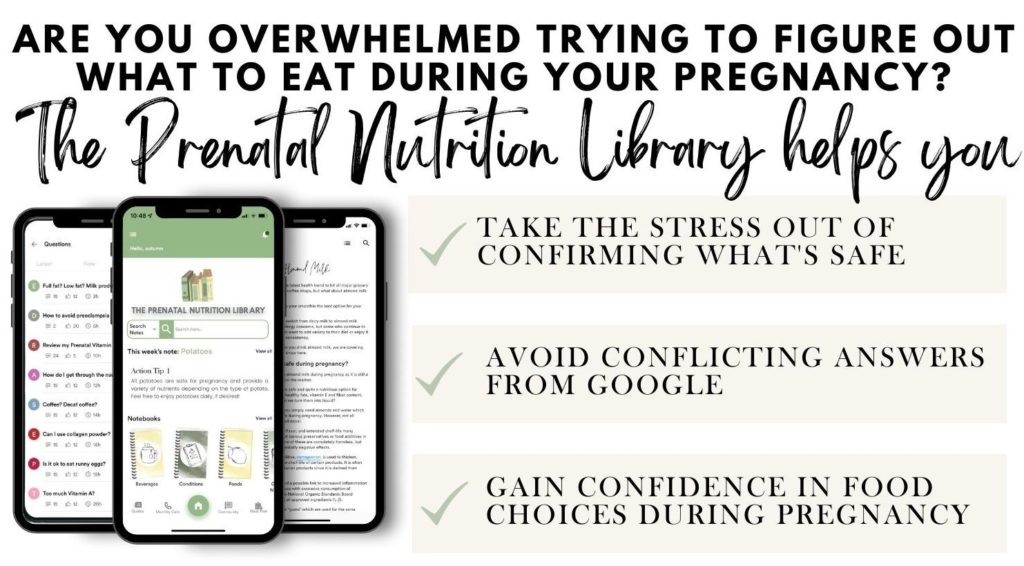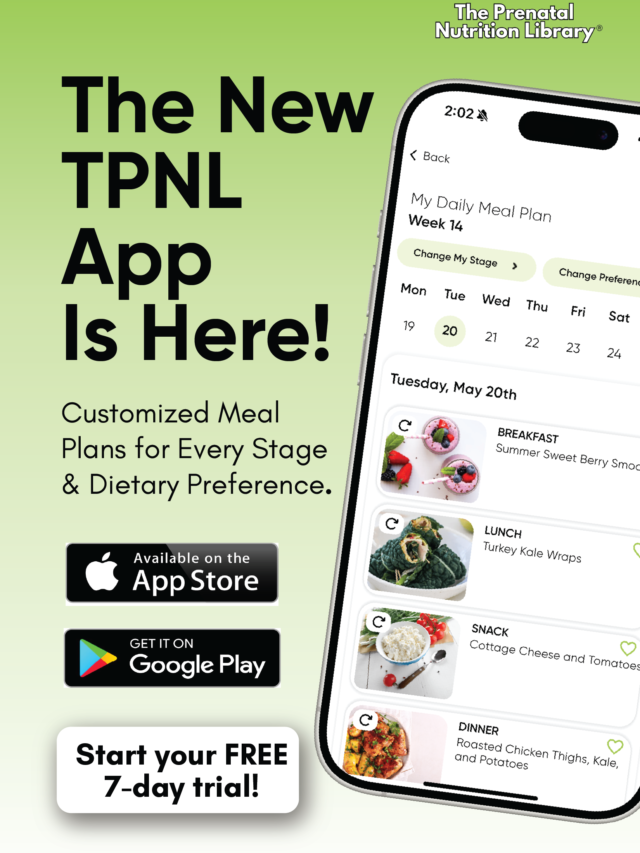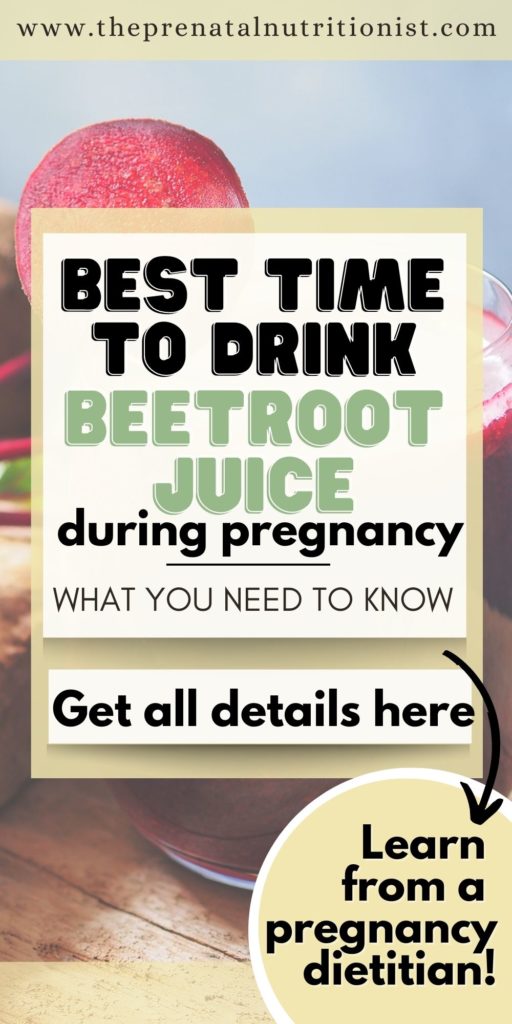
Beetroot juice is a deep purple-red drink made from the root vegetable beetroot. Also known as beets! Beetroots taste earthy and sweet and have a distinct purplish-red color. These vegetables are packed with nutrients, high in antioxidants, and contain plenty of fiber.
They are a great addition to the pregnancy diet because they offer plenty of health benefits for pregnant people. Consuming beets (and beetroot juice) may help with maintaining healthy blood pressure, improving digestion, and may help reduce the risk of anemia.
Despite the many obvious benefits of beetroots in pregnancy, juice can be a confusing topic! So today, I am dedicating this post to discussing the benefits and best time to drink beetroot juice during pregnancy.
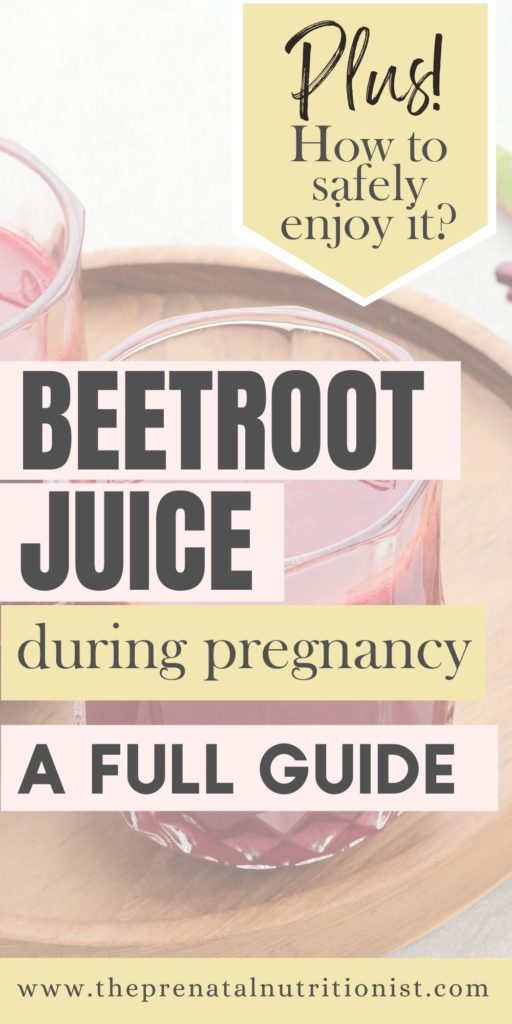
Best Time To Drink Beetroot Juice During Pregnancy
Beetroot juice is a somewhat popular drink associated with various health benefits, including for pregnant women. It is abundant in nutrients like non-heme iron, folate, vitamin C, and potassium, which are essential for the overall health of both the mother and the baby. I’m often asked if there’s a best time to drink beetroot juice during pregnancy for the most benefits.
There’s a myth that the best time to drink beetroot juice during pregnancy is on an empty stomach in the morning. “Supposedly” doing this has more benefits. The truth is beets and beetroot juice can be consumed at any time of day! I recommend pairing beetroot juice with a meal versus drinking it on an empty stomach to support better blood sugar control.
Beetroot juice can positively affect pregnancy as it is rich in nutrients that promote the healthy development of the fetus. The juice contains folate, crucial for preventing birth defects in the baby’s brain and spine. It also contains non-heme iron, which helps reduce the risk of iron-deficiency anemia for the mother during pregnancy.
There are very few risks to consuming beetroot juice during pregnancy. However, it is best to consume in moderation. I’d recommend choosing beetroot juice that is pasteurized and free from added sugar. Besides drinking beetroot juice, you could incorporate it into a smoothie, homemade popsicle, or other recipes. Read below for the effects of beetroot during pregnancy.
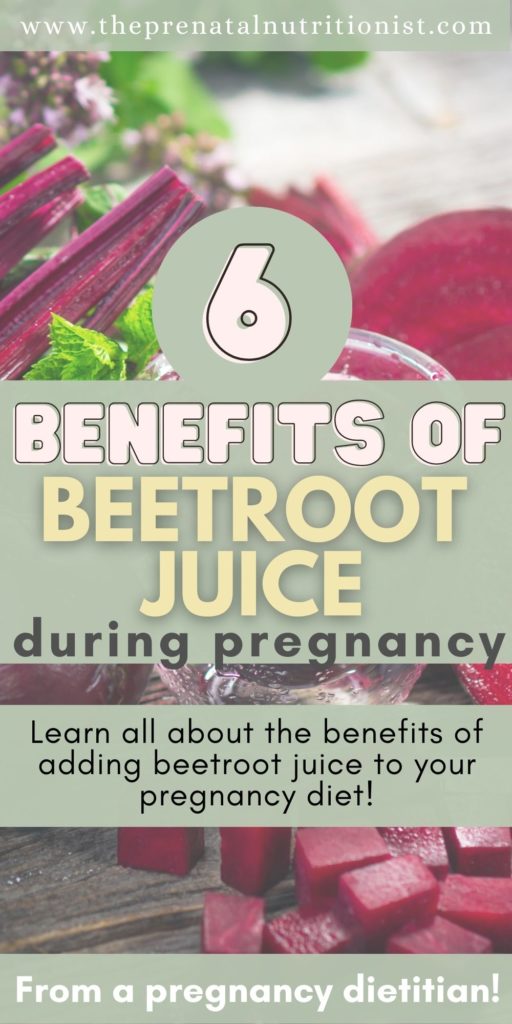
Beetroot Juice Benefits During Pregnancy
It may help keep constipation at bay.
Constipation is a common symptom experienced by pregnant women for many reasons, including hormonal changes, supplement changes, and the growing uterus putting pressure on the colon. Bioactive compounds in beets and beetroot juice have been found to promote good gut health. Beet juice does not have the fiber that beets have, but if you incorporate whole beets, you also get the benefit of fiber to promote digestive health and regular bowel movements further.
It may lower the risk of fetal growth restriction.
Beetroot has the unique ability to boost nitric oxide levels in the body. Nitric oxide is a gas produced in the body that helps to dilate blood vessels, improving blood flow and reducing high blood pressure. This function can also improve blood flow to the placenta and reduce the risk of fetal growth restriction. Remember that further research is needed to confirm recommendations, and most studies on this topic are animal studies.
It helps to prevent neural tube defects.
Beets and beetroot juice contain folate, an essential nutrient required for the healthy development of the fetus. Adequate folate intake during pregnancy helps prevent fetal growth restriction and prevent neural tube defects, such as spina bifida, in the baby. One cup of beets, which is what beetroot juice is made from, contains about 25% of the recommended daily folate intake for pregnant people. This makes beetroot juice a great option to add to your pregnancy diet.
It may lower the risk of preeclampsia.
Preeclampsia is a serious pregnancy complication. It is characterized by high blood pressure, protein in the urine, and possible damage to organs like the liver and kidneys. With its high nitrate content, beetroot juice has been shown to improve blood flow and lower blood pressure in non-pregnant women. Non-pregnant people with high blood pressure could benefit from beetroot juice. Newer studies have also found that regular consumption of beetroot juice can also help lower the risk of developing preeclampsia during pregnancy.
Supports immune health.
Pregnant women are more susceptible to infections and illness due to weakened immunity during pregnancy. The vitamin C in beetroot juice helps strengthen and support the immune system. Vitamin C is essential for developing the baby’s bones, skin, and connective tissue.
It may reduce the risk of anemia.
Anemia is a common complication experienced worldwide by pregnant women due to the increased blood volume and demand for iron. Beetroot juice is a good source of non-heme iron, which helps boost iron intake and reduces the risk of pregnancy anemia. The body more easily absorbs the iron in beetroot juice because beets also contain vitamin C. This vitamin aids in the absorption of plant-based iron. You can find more natural remedies for anemia during pregnancy HERE.
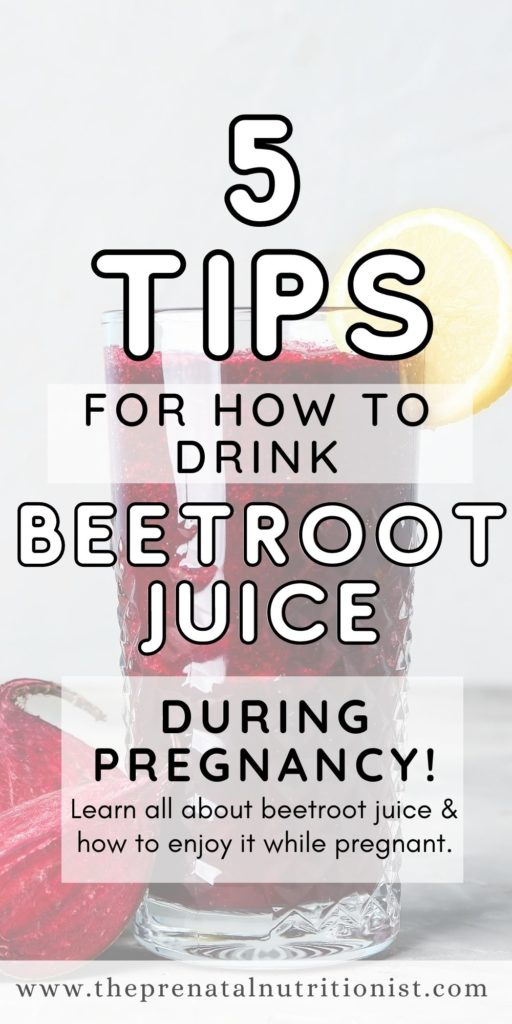
How To Drink Beetroot Juice During Pregnancy
Pregnancy is a time of heightened awareness about the foods and beverages we are consuming. Consuming beetroot during pregnancy is safe, but there are a few considerations to remember. Here are some tips to follow while drinking beetroot juice during pregnancy:
Preparing the Juice
The best food safety practice would be buying store-bought pasteurized juice during pregnancy. If you decide to make beetroot juice yourself at home, thoroughly wash the beetroot before consuming it. Add beetroot juice to a smoothie to create a more balanced meal or snack.
Be sure to incorporate a source of protein and fat. For added fiber and flavor, you can add small portions of other fruits, such as apples, oranges, and berries. For added nutrition, you can also add raw vegetables such as carrots, celery, and spinach. Aside from the added fiber, there are also additional health benefits of eating produce like oranges, celery, and pomegranates during pregnancy.
Safe consumption
As previously mentioned, it’s best practice from a food safety standpoint to choose pasteurized juices during pregnancy. Unpasteurized juice does carry a slightly higher risk for the potential to cause food borne illness. If you decide to make your juice at home, please wash the produce thoroughly before juicing.
Considerations
It is best to drink beetroot juice in moderation. For example, up to 1 cup in a day. Beetroot juice is a source of carbohydrates and sugar with minimal protein, fat, and fiber. Pairing beetroot juice with a well-balanced meal with plenty of protein is ideal for promoting better blood sugar management. Whole beets versus juice will be a better source of fiber.
Adding beets to your diet can cause urine/feces to turn pink. The technical term is beeturia. This is normal. It can be more common in those with iron deficiency, so it might be worth discussing with your doctor if you suspect this. Of course, if you have any concerns, don’t hesitate to contact your healthcare team.
Benefits
Overall, beetroot juice is an excellent source of nutrients for pregnant women. It is packed with vitamins and minerals such as folate, non-heme iron, and vitamin C, essential for fetal development. Drinking beetroot juice during pregnancy may help improve blood circulation, reduce inflammation, which can help with fatigue and weakness and reduce the risk of preeclampsia.
Moderation is key
Like most other foods and drinks, moderation is key while consuming beetroot juice during pregnancy. Juice is a beverage low in fiber, protein, and fat and high in carbohydrates and sugar. Well-managed blood sugar levels are essential for all pregnant women.
All in all, drinking beetroot juice (or eating beets) is safe during pregnancy!
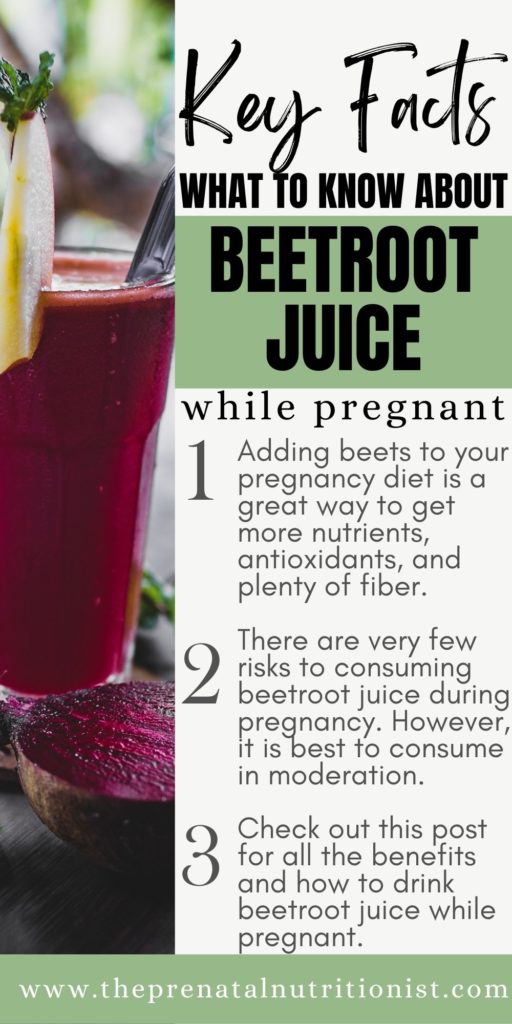
Beets and beetroot juice are excellent sources of folate and other nutrients for pregnancy.
Drinking beetroot juice and eating beets during pregnancy can have numerous health benefits. Juice should be consumed in moderation, though, and along with a well-balanced diet. But if you don’t like beets, don’t worry. Plenty of other foods are high in folate, fiber, vitamin C, and iron to include in your pregnancy diet.
Check out the blog and sign up for The Prenatal Nutrition Library to learn more about foods to support a healthy pregnancy and growing baby. When you join the library, you will unlock HUNDREDS of guides on nutrition topics for preconception and pregnancy. See you there!
